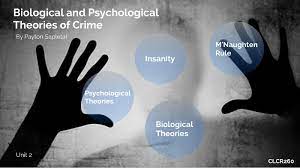Biological theories of crime
Apr 01, 2023
This paper explains the concept of biological theories of crime, which suggest that certain biological and environmental factors may predispose individuals towards criminal behavior. It examines the most influential theories in this field, including those related to genetics and hormones, brain functioning and structure, as well as socioeconomic status. To illustrate how these theories are applied, case studies will be used to show how biological factors can be linked with law violation. The paper concludes by discussing the implications of biological theories for our understanding of crime prevention and rehabilitation.
The notion that certain physical and mental characteristics may make a person more predisposed to criminal behavior is an idea which has been around for centuries. In recent years however, scientific advances have enabled researchers to gain a greater insight into the relationship between biology and criminality. In particular, they have been able to identify specific biological and environmental factors which may be associated with a higher risk of criminal behavior.

One of the most significant biological theories is that of genetics, which suggests that criminality can be partly attributed to genetic inheritance. While this theory has been controversial in the past due to ethical concerns, recent studies have shown some evidence for heritability of crime-related traits such as impulsivity, aggression, and substance abuse. Additionally, certain genetic disorders have also been linked with criminal behavior; for example, individuals with antisocial personality disorder (ASPD) are more likely to engage in lawbreaking activities than those without the disorder.
Hormonal imbalances have also been proposed as a potential cause of criminal behavior. For instance, studies have shown that individuals with high levels of testosterone are more prone to violent and impulsive behavior. Other hormones such as dopamine, serotonin and cortisol are also thought to be involved in influencing criminal behavior through their effects on mood and impulsivity.
In addition to biological factors, research has also suggested a link between brain functioning and criminal activity. Individuals with structural abnormalities or damage in the prefrontal cortex can experience difficulty controlling their impulses which may lead to increased risk-taking behaviors and law-breaking activities. Similarly, those with a lower level of executive functioning can struggle with decision-making skills, making them more likely to engage in criminal acts out of poor judgment.
Finally, socioeconomic status is another area which may be connected to criminality. Individuals from lower socioeconomic backgrounds often lack the resources and support which can provide them with opportunities to develop self-control, leading to an increased risk of criminal behavior.
